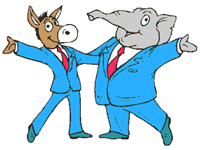April 28, 2013
Think New Mexico, which in recent years spearheaded efforts to establish full-day kindergarten, get rid of the food tax and reform the Public Regulation Commission, is turning its eye to opening up political party primaries.
 |
| Fred Nathan |
Last week, Fred Nathan, founder and executive director of the think tank, wrote to the state chairmen of both major parties asking them to consider changing the rules of their respective primaries to allow independent voters to participate.
Full disclosure here. As faithful readers of this column should know, I’m a proud DTS (Declined to State, which is the official designation of independents in New Mexico).
And I have used this column to beat the drum for open primaries (it’s also the editorial position of the newspaper). It’s hardly a radical idea. Democrats and Republicans let unaffiliated voters vote in primaries in a majority of states.
In his letter to the party chiefs, Nathan — also a card-carrying DTS — used familiar arguments for opening the primaries to us Declined-to-Staters. He predicted it would increase participation in primaries, which last year fell to an anemic 24 percent of the total number of registered voters.
Nathan also noted that it’s unfair that all taxpayers, independents included, pay for the primaries in the state, even though independents — who account for 18 percent of all voters statewide, 20 percent in Santa Fe County — are barred from participating.
But he also used an interesting argument I hadn’t thought of before.
“By including and listening to independent voters, you will better position your party to win the general election,” he wrote. “Since independents often comprise the deciding swing votes in close elections, gaining their support early could make the difference in many elections. So there will be an advantage to whichever party moves first to open its primaries.”
How do party leaders feel about this?
Republican state Chairman John Billingsley didn’t sound like he was embracing the idea last week. Through a spokeswoman, he said, “While we will review the request, the idea of open primaries allows for outside groups to organize and disrupt the party’s primary process. As a party, we seek to keep primaries as they are in order to ensure that the best possible Republican candidates are put forth for each race.”
But Javier Gonzales, who was state Democrat chairman until the end of the week, said he likes the idea. “It’s not only healthy for democracy but for the Democratic Party,” he said. “I believe our ideas would resonate for many independents.”
He also said he agrees with Nathan that letting DTS voters into the Democratic primary would help his party in the general elections.
But Gonzales noted Thursday that a new chairman would be elected this weekend. “Hopefully the next chairman will work to adopt this,” he said.
Note that Nathan is going to the party chairmen to try to instigate this change. Not the Legislature. I’m sure he’s well aware of the sad result last year with a proposed constitutional amendment to allow unaffiliated voters to vote in primaries.
 |
| Rep. Andy Nunez changing his registration to Declined to State in 2011 |
Supporters argued that opening the primaries would lead to more participation in the process.
“I would do anything to get more people to vote,” said Rep. Gail Chasey, D-Albuquerque, who at the time was chairwoman of the committee.
 Everything but vote for Nuñez’s proposal, it turned out.
Everything but vote for Nuñez’s proposal, it turned out.Chasey was joined by every present member of her committee, Democrat and Republican coming together in a display of bipartisan unity, voting to table the joint resolution and keep independents from voting in primaries.




